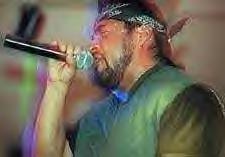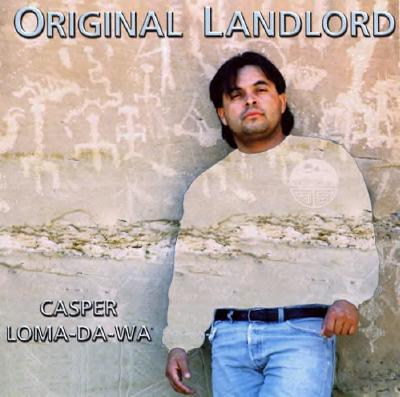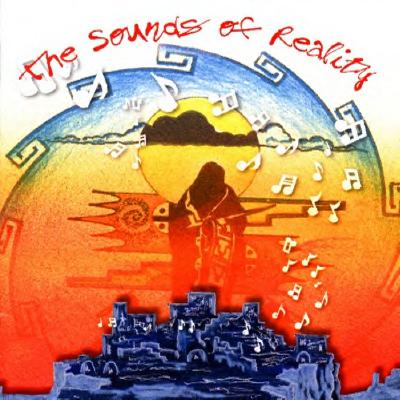|
Canku Ota |
|
(Many Paths) |
|
An Online Newsletter Celebrating Native America |
|
December 30, 2000 - Issue 26 |
|
|
|
Hopi Message Takes Form of Reggae Beat |
|
by Hernan Rozemberg The Arizona Republic |
|
photo of Casper Loma-da-wa by David Soto The Arizona Republic |
 Performer
melds traditional beliefs, modern expression Performer
melds traditional beliefs, modern expressionAs he walked down a dirt road in the Jamaican countryside, he thought he might as well have been back on the Hopi Reservation in northeastern Arizona where he grew up. Replace the Caribbean island's tropical rain forest with the desert mesas that house the reservation and the scene becomes all too familiar. Dire poverty. Few job opportunities. Government oppression. A steadfast struggle with anachronistic thoughts of returning to the glorious days of yore. And a strong musical tradition that serves as a catharsis for freedom and justice. Thus, Casper Loma-da-wa had found his calling - essentially, to follow the footsteps of Jamaican reggae legend Bob Marley by using the popular, politically embedded music to bring attention to the plight of his people. And though he's been performing for only five years, he's gearing up to take his reggae show to Washington, D.C., as a headliner at the American Indian Inaugural Ball in Arlington, Va., on Jan. 20. The event is one of several soirees lined up to mark George W. Bush's inauguration as president.  What at first glance may seem like an odd connection has actually turned out to be quite a natural
transformation. Many Native Americans have latched on to reggae's beat and message as a contemporary version of
the traditional chanting and drumming that lie at the base of their culture. What at first glance may seem like an odd connection has actually turned out to be quite a natural
transformation. Many Native Americans have latched on to reggae's beat and message as a contemporary version of
the traditional chanting and drumming that lie at the base of their culture."Reggae music is struggle music," Loma-da-wa, 32, says. "I've found it to be my best way to channel life. I like to think of my songs as my versions of redemption." His Hopi name means "beautiful sun" and was given to him by his ever-influential grandfather, Sankey Lomayesva. He also nicknamed him "Casper" after the cartoon ghost because of his ability to disappear just before a spanking. Loma-da-wa is not the only one feeling redeemed. "It's his story and it's our story he's singing about," explains Irene Herder, a Navajo living in Virginia and a member of the committee that chose Loma-da-wa out of 25 applicants to play to a crowd of 4,000 at the inaugural ball. "I had never heard of a Native doing reggae, but he won us over real quick. The moment I played his CD, everybody got up and started dancing." But it hasn't always been so easy for Loma-da-wa to reap success. Leaving the reservation Born Calvin Arthur in Winslow to a Hopi father and Navajo mother, he grew up between Holbrook and Kykotsmovi on the Hopi Reservation. Curiously, it was there that he first heard reggae as a youngster attending "Reggae Inna Hopiland," a popular annual stop for big-name bands like Steel Pulse and Burning Spear. But his growing days on the reservation where cut short. After witnessing domestic violence and alcoholism and occasionally running into mischief, Loma-da-wa left the area and moved in with friends in Tucson, where he graduated from high school. There, he put his songwriting talent to the test for the first time with the Cassanova Players, a rap group he helped form.  A college scholarship fell through and he found himself working short-lived
jobs until, at age 22, he realized he had reached a low point. Lonely, broke and confused, he wound up back on
the reservation living with his grandfather. A college scholarship fell through and he found himself working short-lived
jobs until, at age 22, he realized he had reached a low point. Lonely, broke and confused, he wound up back on
the reservation living with his grandfather.The reconnection with his roots proved to be a turning point. He landed a road surveyor's job with a construction company that took him to several Western states and provided a comfortable $60,000 annual salary. But six years, a new pickup truck and new house for his mother later, he made the risky decision to go full time with his music career. With his savings, he created his own label, Scottsdale-based Third Mesa Music, and put out his first CD in 1997, Original Landlord, with 602, the local band he assembled. This year, he produced his second album, The Sounds of Reality. Connecting with fans Freddy Honhongva, who grew up on Hopi land and now lives in Flagstaff, is amazed at how Loma-da-wa has been able to juxtapose traditional beliefs with modern expression. "I don't know how he does it. Must be reggae somehow bringing the two together," Honhongva said during a recent concert in Mesa. It's the everyday struggle of "urban skins" - Native Americans living away from the homeland who try to keep cultural traditions alive in mainstream society. "I understood right away the message he was bringing. He's like our Bob Marley, letting people know about the Native American struggle in the U.S.," offers Stan Vásquez, 34, a Pima who lives on the Salt River Reservation east of Scottsdale. Reggae's global popularity has grown because people from so many races and ethnicities have identified or empathized with the music's Jamaican creators. So it has come as no surprise to Jamaican-born Ira Osbourne that the reggae flame has sparked in Native American land. "They are just as much victims of a repressive system as we are," says Osbourne, a member of Tucson's One Blood Reggae Band. Several years ago he took Loma-da-wa to his native Negril to introduce him to reggae's roots. "Casper sings from the gut, he's got the feeling. Only instead of Africa, he's singing about his native land, Hopi." So he simultaneously entertains and educates. But as he sees it, Loma-da-wa isn't asking any favors of anybody. "It's not like I'm trying to change the world on my own. I'm just sharing how I've seen life on the reservation. If I lead even one person to be interested and listen, then I've done my job." Should he ever feel no longer able to do that job, Loma-da-wa can always go home. Another pair of helping hands will always be welcome on his grandfather's farm on Hopi land. |
|
Casper Loma-Da-Wa Bio |
|
Third Mesa Music |
|
|
|
|
| Canku Ota is a free Newsletter celebrating Native America, its traditions and accomplishments . We do not provide subscriber or visitor names to anyone. Some articles presented in Canku Ota may contain copyright material. We have received appropriate permissions for republishing any articles. Material appearing here is distributed without profit or monetary gain to those who have expressed an interest. This is in accordance with Title 17 U.S.C. section 107. |
|
Canku Ota is a copyright © 2000 of Vicki Lockard and Paul Barry. |
|
The "Canku Ota - A Newsletter Celebrating Native America" web site and its design is the |
|
Copyright © 1999, 2000 of Paul C. Barry. |
|
All Rights Reserved. |